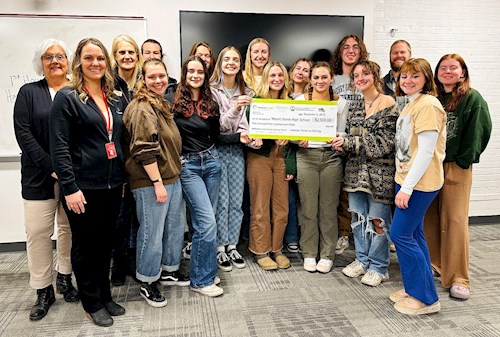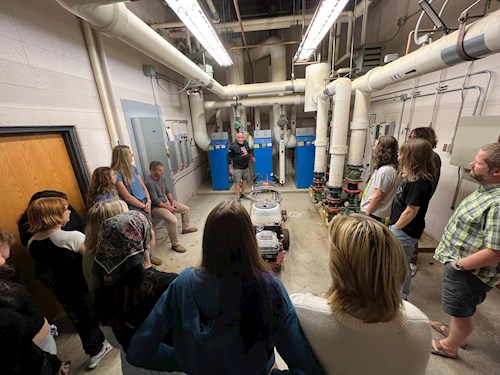

By: Isabella Lubotsky
Mount Horeb High School’s Clean Energy Team is making change happen and improving the sustainability of their school and community. In Fall 2023, Mount Horeb’s AP Environmental Science Club won the Renew Our School’s challenge, one of only two schools in Wisconsin to successfully complete the annual challenge.
Focus on Energy’s Renew Our School’s Challenge is a fun way for students and staff to learn and take charge of energy conservation efforts in their schools. When schools enroll in the challenge, Focus on Energy funds the installation of an e-gauge energy monitoring system, which tracks and reports real-time energy use so conservation efforts can be actively monitored.
Focus on Energy also provides schools with equipment such as light meters, infrared thermometers, and Kill A Watt™ monitors. After receiving training from the Wisconsin K-12 Energy Education Program (KEEP) and Focus on Energy staff, students perform energy audits in 20 different rooms within the school. Based on these results, students create energy saving goals to focus on for the duration of the competition. Upon completion of these steps schools earn an initial 60 points in the competition.
To keep earning more points, schools take action across five categories: plan, promote, educate, motivate, and evaluate. First the team creates a plan for action by setting goals and conducting an energy audit. Then schools receive points for promoting their project, speaking at meetings, etc. Points are also awarded for incorporating the topic into lessons, offering points to students for learning about different types of energy and bringing in local experts to speak. Then, once the conservation measures are implemented, students have the chance to receive points for reflecting on their work, creating an Energy Action Plan, and encouraging the administration to adopt an Energy Policy for the school.
In order to win, schools must win the most points in their cohort. Winning schools earn a $2,500 prize to further implement energy efficiency projects in their buildings.

For the first two weeks of the challenge, the Mount Horeb High School Energy Team spent time taking measurements of their 20 classrooms with light meters and thermometers, setting goals based on their audit and e-gauge data.
The remaining duration of the challenge was spent developing and teaching lesson plans to classes, making announcements, presenting at staff meetings, making signs encouraging energy saving behaviors, and focusing on changing what they can control, such as behavioral habits (like reminding people to turn off the lights and shut down their computers). To further their understanding of their school’s energy system, they even toured the high school’s boiler room!
These actions reduced their building’s energy consumption by 2.6%. Mount Horeb High School ended the competition by earning a final score of 335 points, earning the highest score in their cohort and winning the challenge.
However, that wasn’t the only benefit of their actions. As a result of their outreach, more students were able to get engaged in energy conservation and be inspired to get involved with sustainability. The team even grew from 17 to 20 members after the challenge was over!
Now that the challenge is complete, the students are looking to keep the momentum going. The students said the hardest part of the challenge is deciding what to do with the prize money. One possibility is planting saplings throughout the district. Another option is funding field trips for students to learn more about sustainability and become more deeply engaged in what’s happening around them. No matter what initiative the team ends up deciding on, the most important factor for them is to start something that will continue even after they move on after graduating.
Mount Horeb Middle School was a previous competitor in the challenge and it was their participation efforts that inspired this year's high school students to take action within their own classrooms. Now that the high school team is familiar with the challenge, they are interested in providing leadership for their younger peers to help them win future challenges and uplift the district as a whole.
Not long after the competition was complete, students from both the high school and middle school teams were recognized and invited to present at a Mount Horeb School District meeting. Dr. Salerno, Superintendent of Mount Horeb Areas School District said, “As a district, we are so impressed by The Energy Team! for their accomplishment. Earning the ‘FA23 Wisconsin Winner’ title further proves their dedication to Mount Horeb Area School District’s future in sustainability”.
Although winning more competitions would be a plus, the team all agrees that “the real winner should be the Earth”.
Interested in making a difference in your own school? The process for enrolling in the challenge starts with filling out an interest form, providing information about the school building, and starting the process of e-gauge installation. Schools are eligible for up to a $1,200 reimbursement of e-gauge installation fees, and they get to keep the e-gauge after the challenge. Schools must pay a $250 participation fee, however this fee also gets reimbursed upon successful completion of the challenge. Some schools may be eligible for discounted participation costs through Resource Central or other scholarships to waive this fee. Fall 2024 competition dates are October 7th through November 15th, with enrollment closing on September 15th.
Participation in this challenge is a great opportunity to showcase student driven initiatives involving energy conservation. It gives students an outlet to take action in their own communities for issues they are passionate about while building more momentum at the district level.